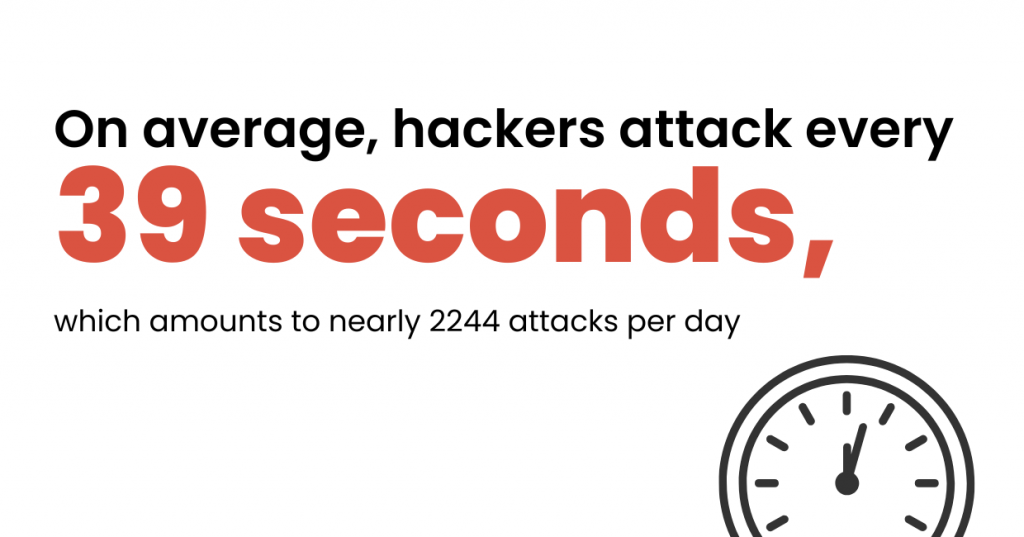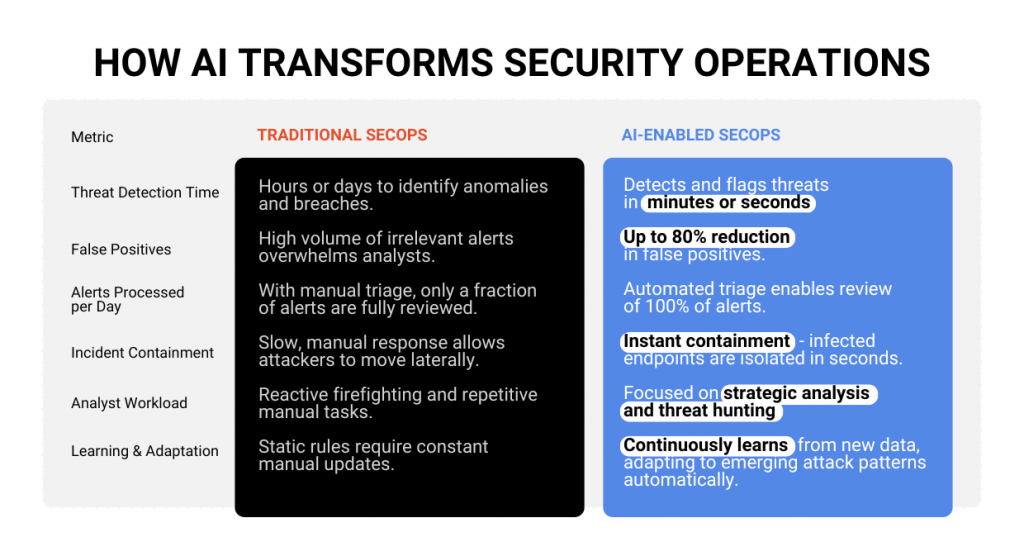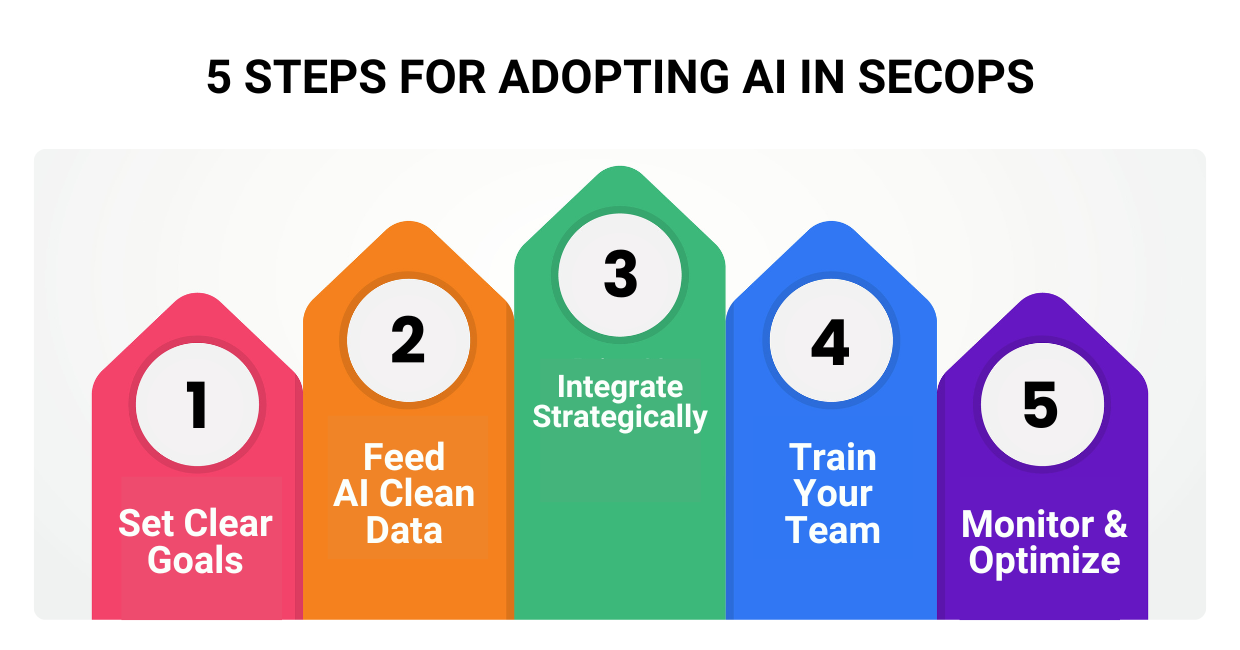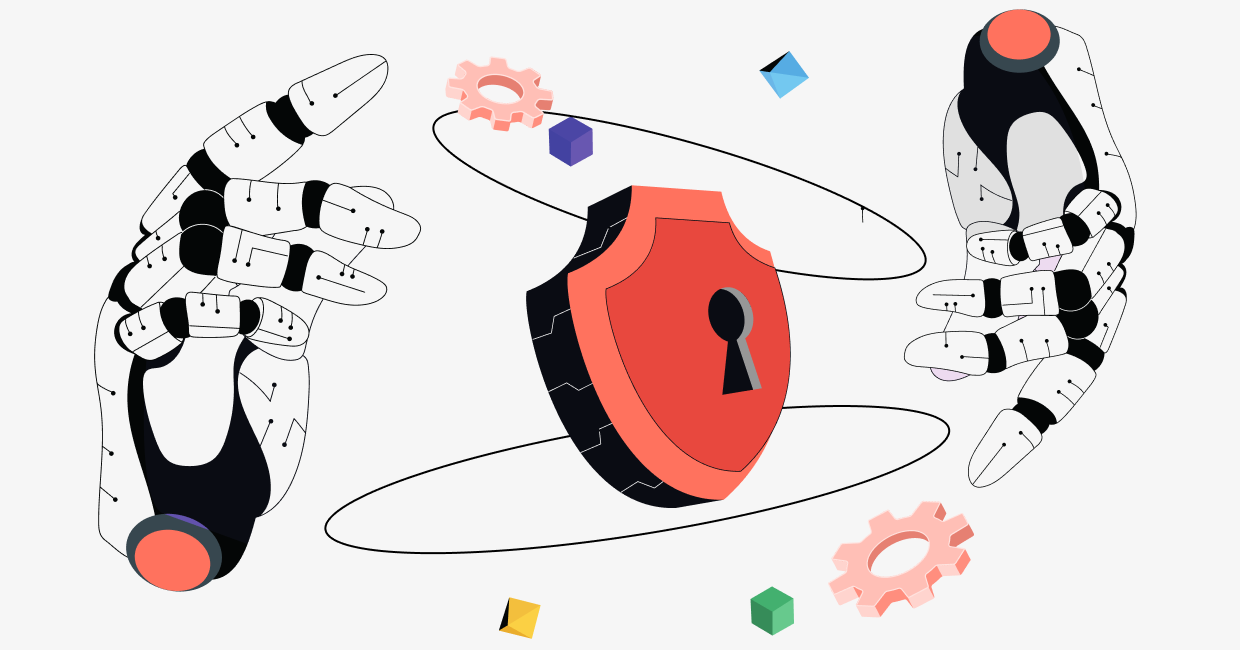When it comes to cybersecurity, speed is everything. A single missed alert or delayed response can cost millions, shake customer trust, and slow down business momentum.
In 2024, 70% of security leaders reported their organization suffered at least one “significant cyber attack,” while global cybercrime damage is expected to reach 20 trillion U.S dollars by the end of the year.

While these numbers are alarming, companies are not prepared. Today’s digital environments are too vast and complex for even the most skilled security teams to monitor manually and respond to every attack on time.
AI for SecOps is a solution that changes the approach to security from reactive defense to anticipatory, intelligent protection.
Let’s unpack what AI for SecOps means, why it’s becoming essential, and how forward-looking businesses are already putting it into practice.
What Is AI for Security Operations?
AI for SecOps (Security Operations) refers to blending human expertise with AI-driven automation to accelerate detection, prevention, and response across the security stack.
Traditional security operations centers rely heavily on signature-based rules, static thresholds, and manual investigations. Those approaches increasingly struggle with AI cybersecurity risks and attacks that become more sophisticated and unpredictable.
With AI in SecOps:
- The system learns from data streams to identify emerging patterns and anomalies in real time.
- Threats that once took hours or days to catch are surfaced in seconds.
- Teams shift from firefighting to strategic oversight and intervening when AI flags high-risk scenarios.
This evolution transforms security from reactive to proactive.
Now that we understand the “what,” let’s explore why organizations are racing to adopt AI in SecOps, and what’s driving that shift.
Why Businesses Are Turning to AI for Cybersecurity
Cybersecurity today has become a data challenge. Every click, connection, and cloud workload generates information, and attackers are exploiting that scale and complexity faster than humans can respond.
These are the key security challenges organizations struggle to solve:
- Expanding attack surfaces (thanks to cloud, mobile, and hybrid work)
- Alert fatigue among analysts
- Growing data volumes that outpace manual review
- A global shortage of cybersecurity talent
AI can address all of these at once. It processes enormous datasets, filters out false positives, and automates repetitive tasks so that human analysts can focus on strategy instead of going through endless alerts.

Forecasts back this shift: the global market for AI cybersecurity tools is expected to grow by nearly 28% by 2030. AI becomes the only way to keep pace with attackers who use AI automation themselves.
That’s why smart organizations are moving beyond pilot projects and embedding AI deeply into SecOps workflows. Below are eight powerful use cases showing how AI is already strengthening security posture across industries.
8 Agentic AI Use Cases for SecOps: Strengthen Your Security Posture
In practice, AI for SecOps isn’t just one tool. It’s an ecosystem of automation, analytics, and intelligent orchestration. Here’s how leading organizations are applying it right now.
1. Smarter Threat Detection
Traditional systems rely on known “signatures” — patterns from past attacks. Agentic AI security, on the other hand, detects anomalies in real time, even if it’s something the system has never seen before.
For example, if a user downloads an unusual file or a device behaves oddly, AI can flag it immediately, helping you catch zero-day threats before they spread.
2. SOC Automation: Free Your Experts
Security teams often face thousands of alerts a day, while most of them are irrelevant. AI can filter, categorize, and prioritize those alerts automatically.
Instead of spending hours on routine checks, your analysts can focus on high-value investigations that actually have an impact on your business.
3. Automated Incident Response
When a threat is detected, every second counts. While humans need more time to respond appropriately, AI-driven Security Orchestration, Automation, and Response (SOAR) systems can act instantly: isolate infected devices, block malicious IPs, or contain a breach before it escalates. The faster the response, the less damage.
4. Preventing Privilege Creep
Over time, employees typically accumulate permissions beyond what they need — this risk is known as “privilege creep.” Attackers often use it as a pathway to get past defense systems.
Security AI agents continuously monitor and analyze access patterns, flag accounts with unused or excessive rights, and recommend or enact privilege revocation.
5. Identifying Shadow IT
Not every device or app on your network is officially sanctioned. Shadow IT, such as unauthorized SaaS, cloud instances, rogue VMs, or unmanaged endpoints, opens unforeseen gaps in your security.
AI helps uncover these blind spots by discovering unknown assets, deviations from approved baselines, or unexpected network traffic flows.
6. Outsmarting Phishing Attacks
Phishing has evolved: attackers now use generative AI to produce compelling, context-aware emails that can trick anyone. But AI is your defense, too.
By analyzing email metadata, sender behavior, language patterns, and contextual signals, AI detects previously unseen phishing attempts and adapts as adversaries shift tactics.
7. Endpoint Protection Everywhere
From laptops to mobile devices, endpoints are the front lines. AI-powered endpoint protection monitors behavior, flags deviations, and can quarantine suspicious processes without degrading performance.
Even if malware isn’t signatured yet, AI can detect its behavior and neutralize it before it spreads.
8. AI Fraud Detection and Risk Analysis
In sectors like finance, retail, or e-commerce, AI excels in detecting fraudulent behaviors. It connects subtle dots (account access from new geographies, sudden high-value transactions, or anomalies in purchase patterns) and surfaces them almost immediately.
Unlike rigid rule engines, AI learns across cases and reduces false positives, so end users aren’t unduly blocked for legitimate activity, but malicious actors don’t slip through either.
How Google Agentspace Takes SecOps to the Next Level
Now, imagine all these security capabilities (automated detection, response, and analysis) seamlessly integrated with your cloud environment with just one single tool: Agentspace.
Built on Google’s leading AI solutions, Gemini and Vertex AI, Agentspace acts as a digital security assistant that:
- Monitors your cloud in real time
- Detects and explains threats in plain language
- Suggests actions or executes them automatically
- Connects securely with your existing GCP tools
When integrated with Zazmic’s expertise in Google Cloud and AI, your business gets the perfect blend of automation, insight, and tailored support, without the usual complexity.
Best Practices for Adopting AI in Security Operations
Before upgrading your SecOps, it’s important to set your strategy. AI in security is not a plug-and-play solution. It’s a journey that ends with success only if clarity, collaboration, and continuous learning are in place.

Here are the key best practices for adopting AI in SecOps:
- Start with clear goals
Define what you want AI to improve: response time, alert accuracy, or fraud detection. - Invest in clean data
AI is always as good as the data it learns from. Ensure your logs and feeds are comprehensive and up to date. - Integrate, but don’t replace
AI enhances your current tools; it doesn’t replace human judgment. - Train your team
Equip analysts to interpret AI findings and make informed calls. - Continuously monitor and refine
Regularly review AI performance to keep it aligned with evolving threats.
When done right, AI stops being another tool and becomes an active partner in your security operations.
Best Practices for Adopting AI in Security Operations
Cyber threats will continue to evolve, but with AI, your defense systems will be ready. By blending automation, analytics, and real-time response, AI for security operations helps businesses stay safe, compliant, and resilient in a world where every second counts.
At Zazmic, we help companies harness Google’s AI tools to strengthen security, simplify workflows, and protect what matters most.
Sign up for a free Google Agentspace workshop, and discover how AI can transform your security operations and tailor protection to your unique business needs.
It’s about staying one step ahead.


